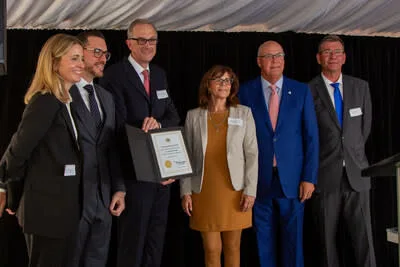Vancouver – Access to high-quality, inclusive child care has a profound influence on children’s language skills and identity. First Nations children, families and communities benefit greatly from culturally based early learning and child care opportunities rooted in self-determination and in the implementation of First Nations’ laws, teachings and practices.
The First Nations Leadership Council (the Union of B.C. Indian Chiefs, the First Nations Summit, and the B.C. Assembly of First Nations) and the governments of British Columbia and Canada gathered to sign a memorandum of understanding (MOU) on early learning and child care for First Nations in British Columbia.
This MOU is an important step on the path to reconciliation. The goal is to support the self-determination of First Nations in British Columbia and advance First Nations’ jurisdiction in relation to early learning and child care.
The First Nations Leadership Council, British Columbia and Canada recognize that First Nations families and children are best supported by early learning and child care programs and services that are designed and led by their community, and respond to local cultures, languages, traditions, practices and laws. Having access to these programs and services is instrumental in creating a foundation for a child’s cultural identity and sense of self.
This MOU is advancing First Nations’ early learning and child care priorities. It is a significant stepping stone in enabling discussions at the political level that respect the self-determination of First Nations and government-to-government relationships between individual Nations and the Crown.
This approach acknowledges First Nations’ inherent rights to self-determination, including the right to control the design, delivery and administration of an early learning and child care system for First Nations that reflects their unique needs, priorities and aspirations.
“Our government is here as a partner. This marks a historic moment for Canada—a pivotal step toward honouring and empowering the self-determination of B.C. First Nations in early learning and child care. By working together, we can ensure that First Nations children have access to early learning and care rooted in their own cultures, designed by and for their communities. This commitment will support the needs and aspirations of First Nations families for generations to come.” – Jenna Sudds, Canada’s Minister of Families, Children and Social Development
“This Memorandum of Understanding marks a significant step toward recognizing and empowering First Nations’ self-determination in early learning and child care. By allowing First Nations to lead programs rooted in their cultures and traditions, we are helping to ensure that future generations grow up connected to their heritage. This agreement is a meaningful move toward reconciliation, and I am proud to support this vital work.” – Joyce Murray, MP for Vancouver Quadra
Also in Port Hardy, BC, home of the Gwa’sala-‘Nakwaxda’xw Nations, Chief Leslie Walkus of Gwa’sala-‘Nakwaxda’xw First Nations and Gwa’sala-‘Nakwaxda’xw Council members, alongside Patty Hajdu, Minister of Indigenous Services, and Grace Lore, B.C. Minister of Children and Family Development, signed a coordination agreement to affirm and restore jurisdiction over children and families. This agreement shows a change in the tide for Gwa’sala-‘Nakwaxda’xw children and families, community, culture and people. This collaborative effort is rooted in the shared understanding that Indigenous children and families should flourish within their communities, surrounded by the embrace of loved ones and the richness of their cultures.
“For decades, governments separated First Nations children from their families and communities, causing grief, trauma and endless sorrow. Today’s agreement restores Gwa’sala-‘Nakwaxda’xw Nations inherent right to care for their children and families, surrounded by love, language and culture. Gwa’sala-‘Nakwaxda’xw children will grow up knowing who they are and where they belong.” – Patty Hajdu, Minister of Indigenous Services









